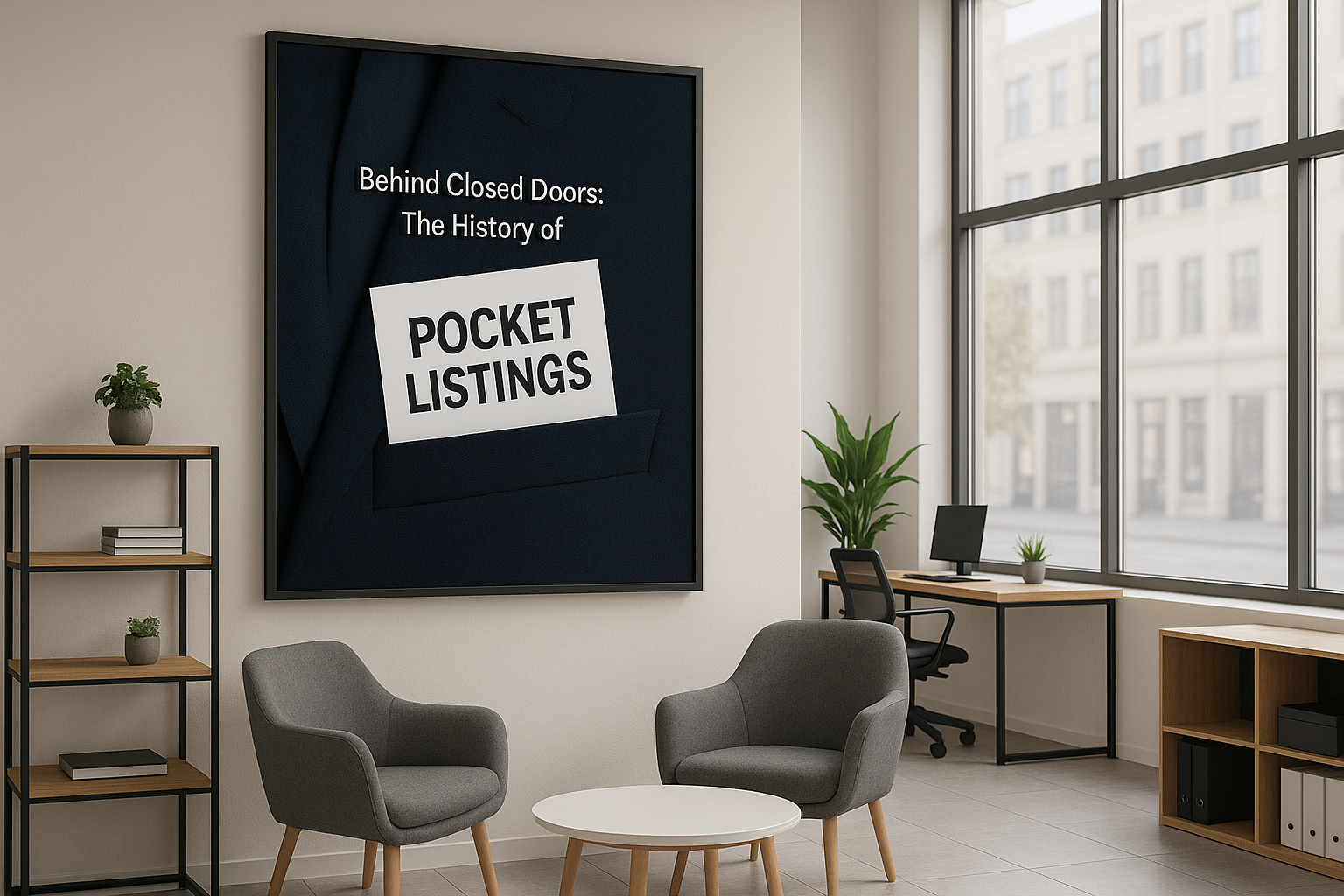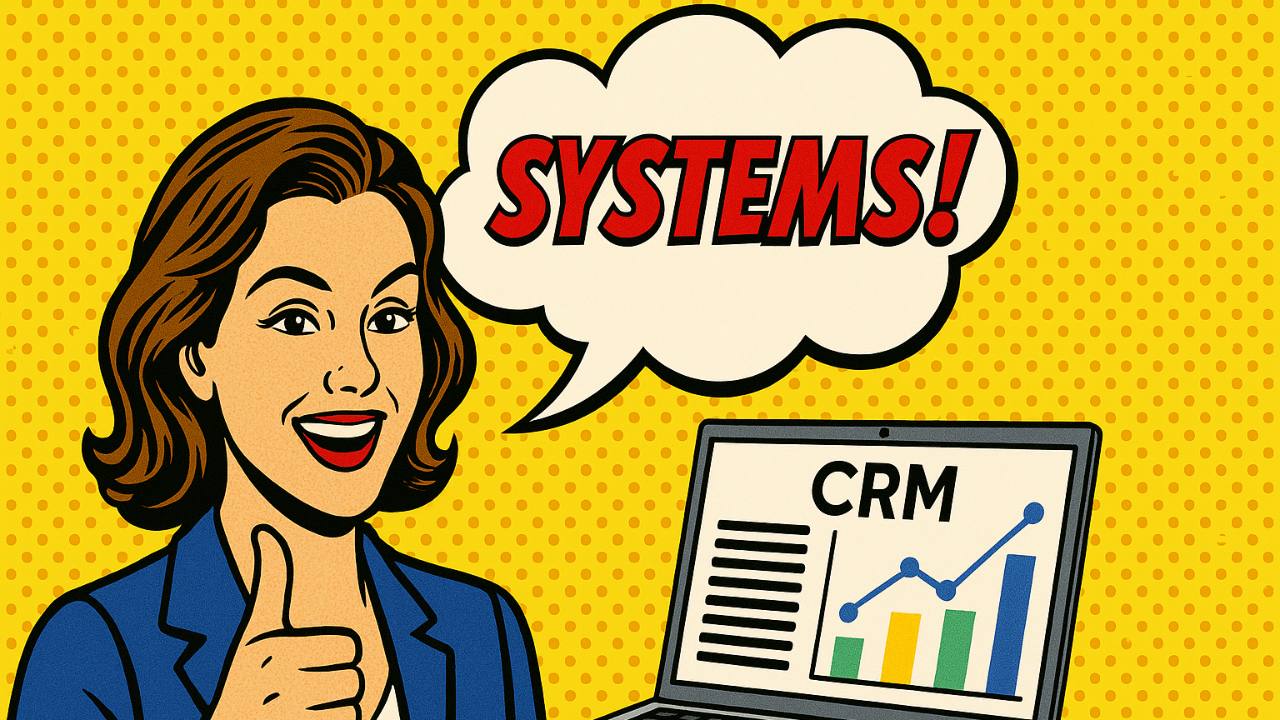Behind Closed Doors: The Long, Twisting Tale of Pocket Listings in Real Estate

By Mark Hughes | Real Estate Agent Roadmap
The Secret Society of Listings
In a business built on open houses, for-sale signs, and “JUST LISTED!” blasts, it’s always seemed a little ironic — almost cheeky — that one of the most enduring real estate practices has involved not marketing a home publicly at all.
Welcome to the world of pocket listings — real estate’s version of an “if you know, you know” club.
But this isn’t just about exclusivity. The story of pocket listings is woven deeply into the evolution of American real estate, tied to technology shifts, market booms, legal changes, and — at times — industry-wide controversy.
Let’s step back in time and unpack how we got here.
What Exactly Is a Pocket Listing?
At its simplest:
A pocket listing is a property for sale that is not publicly advertised on the Multiple Listing Service (MLS).
Instead, it’s privately marketed — often shared only within a broker’s private network, or directly between agents and their select clients.
Key Traits of Pocket Listings:
-
No MLS entry (at least initially)
-
Private marketing (emails, calls, whispers)
-
Selective exposure (the listing agent or brokerage chooses who hears about it)
-
Often requires a signed listing agreement (still legally binding)
A Quick Timeline: The Evolution of Pocket Listings
Pre-1970s: The Norm Was Private
Before regional MLS systems took hold, most real estate sales were inherently “pocket listings.”
Brokers controlled their own “books” of listings, which they only shared with agents they trusted — or those within their firm.
If you wanted to see everything for sale in town, you had to call multiple brokers or cruise around looking for hand-painted signs.
1970s-1980s: The MLS Revolution
As MLSs (Multiple Listing Services) grew, they promised massive benefits:
-
Cooperation between agents
-
Broader exposure for sellers
-
Transparency for buyers
MLS participation exploded. Publicly sharing listings became the expected professional norm, not the exception.
1990s: The Rise of the Internet
When Realtor.com launched in 1996, followed by early brokerage websites, the cat really bolted out of the bag.
Suddenly, buyers could see homes without even talking to an agent first. The information asymmetry that had long favored agents began to erode.
Pocket listings became… well, pocketed even deeper. Seen mostly in luxury markets or special cases.
2000s: The Internet Matures — But So Does Pocket Strategy
High-end sellers — celebrities, CEOs, athletes — didn’t want photos of their mansions zipping across the globe in minutes.
Pocket listings, for privacy reasons, made a roaring comeback in the luxury sector.
At the same time, large brokerages realized they could create exclusive internal networks to double-dip on both sides of a sale (listing agent + buyer’s agent = full commission).
The seeds of ethical debates were planted.
2010s: Pocket Listings Go Mainstream (And Controversial)
Off-MLS selling wasn’t just for movie stars anymore.
In tight inventory markets (like California post-2012), agents began using pocket listings to:
-
Create buyer urgency (“You can get in before anyone else!”)
-
Build personal brand clout (“Look at all my private listings!”)
-
Maintain seller control over showings and terms
By 2018, studies suggested that in hot markets like Los Angeles and San Francisco, up to 30% of homes at certain price points were sold off-MLS.
Enter lawsuits. Enter accusations of fair housing violations.
Enter… the Clear Cooperation Policy.
Why Sellers Have Chosen Pocket Listings
Not all motivations were shady — though, let’s be real, a few certainly were.
Here are the main reasons sellers (and their agents) historically preferred pocket listings:
1. Privacy and Security
High-profile sellers feared stalkers, gawkers, and public exposure.
Even average folks worried about nosy neighbors or internet weirdos scrolling Zillow at 2 AM.
2. “Testing” the Market
Some sellers floated their property quietly to gauge interest or pricing before formally listing.
3. Control Over Showings
No random weekend open houses with half the neighborhood eating your cookies. Only vetted, serious buyers.
4. Perceived Prestige
Off-market properties carried an air of exclusivity — “this home isn’t for just anyone.”
5. Double-Ending Deals
(Speaking frankly here)
Brokers loved pocket listings because if they found the buyer and represented the seller, they could earn both sides of the commission.
Sometimes a win-win — sometimes a huge conflict of interest.
The Major Problems with Pocket Listings

Pocket listings aren’t just a harmless curiosity — they can create real systemic issues:
1. Fair Housing Violations
Selective marketing = selective access.
If certain communities or demographics aren’t even aware a property is for sale, it violates the spirit (and sometimes the letter) of Fair Housing laws.
2. Seller Disadvantage
Limited exposure usually means fewer offers — and weaker negotiating power.
Most sellers net more money when their home is widely advertised and generates competition.
3. Market Data Distortion
If many homes sell without MLS reporting, market comps become less reliable.
This hurts appraisals, market analysis, and industry trust.
4. Reputation Risk
The public assumes agents are looking out for their best interests, not secretly steering deals to their own pipelines. Pocket listings erode that trust.
The Industry’s Response: Clear Cooperation Policy (2020)
In 2020, the National Association of REALTORS® dropped the hammer with MLS Clear Cooperation Policy 8.0, which says:
-
If a home is publicly marketed in any way (even a “Coming Soon” social post), it must be listed on the MLS within one business day.
This was meant to:
-
Level the playing field
-
Ensure fairness
-
Maintain transparent, reliable data
-
Crush the growing trend of massive private listing clubs
Of course, not everyone clapped.
Where Are We Now? 2025 and Beyond
Today, some flexibility has returned with Coming Soon statuses, Delayed Showings, and other MLS tools that try to balance seller privacy with transparency.
But the core principle stands:
If it’s for sale, the market deserves to know.
Yet, interestingly, private marketing hasn’t vanished.
In luxury markets, tiny broker-to-broker whisper networks are alive and well — they’ve just evolved to work more carefully around the rules.
Conclusion: A Tale of Two Markets
Pocket listings have always danced between two worlds:
-
Private salesmanship
-
Public accountability
The real estate industry needs to embrace both strategy and ethics to survive long-term.
Clear Cooperation is the industry’s strong nudge toward openness — and frankly, it’s necessary.
While some edge cases (celebrity sellers, unique properties) might deserve privacy, for the majority of transactions, open marketing is simply better business.
In an age where information travels at light speed, transparency isn’t just ethical — it’s practical.
My take?
Pocket listings were a clever hack when MLSs were messy and the internet didn’t exist.
Today? In 99% of cases, they’re a relic — an elegant but outdated secret handshake.
We can probably do much better, but like the country, we must come together first.
I feel like I would rather win because my clients got all the buyers to see the home, not just the ones with the secret handshake.
Mindset:
"Don't be pushed around by the fears in your mind. Be led by the dreams in your heart."
-Roy T. Bennett
Mastery This Week:
Value-Driven Interaction: The Mindset Essential to SOI Farming Success

Building a thriving business in the real estate industry is about more than just making transactions—it’s about creating meaningful connections that last. When it comes to Sphere of Influence (SOI) farming, the key to unlocking long-term success lies in a mindset centered on value-driven interaction. This approach is not just a strategy; it’s a philosophy that places the needs and interests of your clients at the heart of every interaction, ensuring that you’re seen as a trusted advisor and the agent first in mind when they think about real estate.
At MHC, we emphasize the importance of value-driven interactions as a core part of the mindset for SOI farming. This mindset helps real estate agents foster deeper relationships, build trust, and generate consistent referrals and repeat business. In this blog, we’ll explore what value-driven interaction means, how it applies to your SOI farming efforts, and the strategies you can use to implement this mindset to elevate your real estate business.

Follow me on: Instagram | Facebook | and LinkedIn
[email protected] | 818-480-2864
📌 Seven Gables Agent Roadmap Courses at Your Own Pace. Learn More
📌 The Real Estate Agent Roadmap 12-Months To Mastery 🚀




Responses